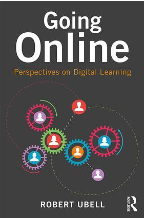Publication Details
| OLOR Series: | ROLE Reviews |
| Author(s): | Kurtis Clements |
| Original Publication Date: | 15 March 2020 |
| Permalink: |
<gsole.org/olor/reviews/2020vol3no1.rev7> |
Publication Note
This review was originally published in Research in Online Literacy, vol. 3, no. 1 (2020).
Resource Overview
Media, Figures, Tables |
Resource Contents
Review of Going Online: Perspectives on Digital Learning
Well-known online learning scholar Robert Ubell’s Going Online: Perspectives on Digital Learning provides readers with a balanced and researched discussion of the nature of online learning and issues related to making the transition. Ubell does not try to proselytize readers as he fully recognizes the shortcomings of online education and the very real concerns faculty and administrators have of the modality. However, Ubell does encourage readers—and in this regard, the book is perhaps best suited for online holdouts and skeptics—to think about online education objectively to better recognize what it is, what it offers, and thus its educational potential. Going Online is a valuable collection of observations and insights of online education for those already teaching online and those who question it.
While online learning is more accepted now than it was ten or twenty years ago, many shy away from teaching online due to misconceptions that the book addresses. Those of us who have been teaching virtually for a while surely know faculty who don’t like online teaching simply because they don’t think it’s as good as face-to-face teaching (evidence bedamned). Ubell points out that in his experience, those who are most opposed to online education tend to know the least about it, pointing out that “Solid research over many years fails to support the overwhelming negative attitudes held by most faculty” (p. 56). The book, however, is not confrontational, though Ubell does present research-based evidence to address common myths and encourages faculty to think more about how technology can impact learning.
One of the common misconceptions of online learning that Ubell addresses is the idea that students taking online courses learn in isolation—that is, they are locked away in rooms, alone, staring at the glow of the computer screen into the wee hours of the night. But as Ubell points out, this image of the all-alone online learner is hardly the case, noting that “most digital courses at colleges and universities in the United States are actually highly interpersonal, instructor-led, and take place in “virtual classrooms,” with other classmates participating continuously in “threaded discussions” and other interactive activities over the internet” (p. 67). As a faculty member who teaches both on campus and online, I can attest that many times during a class discussion where the students are in the same room with me, only a handful participate. Online, however, everyone participates, even the “quiet” students.
The book is divided into two parts: Virtual Classes and Migrating Online. Each part is further divided into chapters such as “What You Can Do Online, But Not on Campus,” “Why Faculty Don’t Want to Teach Online,” and “Who Owns What? Unbundling Online Course Property Rights.” In the chapter titled “Interaction, Diversity, and Evolution in Online Learning,” Ubell makes the point that “Next-generation learners no longer view technology as a luxury, but have adopted it as a necessity. Students now demand that digital education meet their expectations for mobile, accessible, fast, interactive, and never-passive learning” (p. 21). While Ubell is a proponent of online learning, his central concern has more to do with the tools that are needed to engage students in active learning. He writes, “Surprisingly, institutions are just beginning to acknowledge that pedagogically innovative approaches, commonly practiced in online courses, are not often practiced on campus” (p. 21).
In this scary higher education world where competition in the marketplace is fierce, and small, private institutions in particular have become vulnerable to the point of locking their doors, teaching online might make the best economic sense than at any other time. Going Online: Perspectives on Digital Learning presents the kind of information administrators and faculty need to understand better and make the transition to online education.



 Going Online: Perspectives on Digital Learning
Going Online: Perspectives on Digital Learning